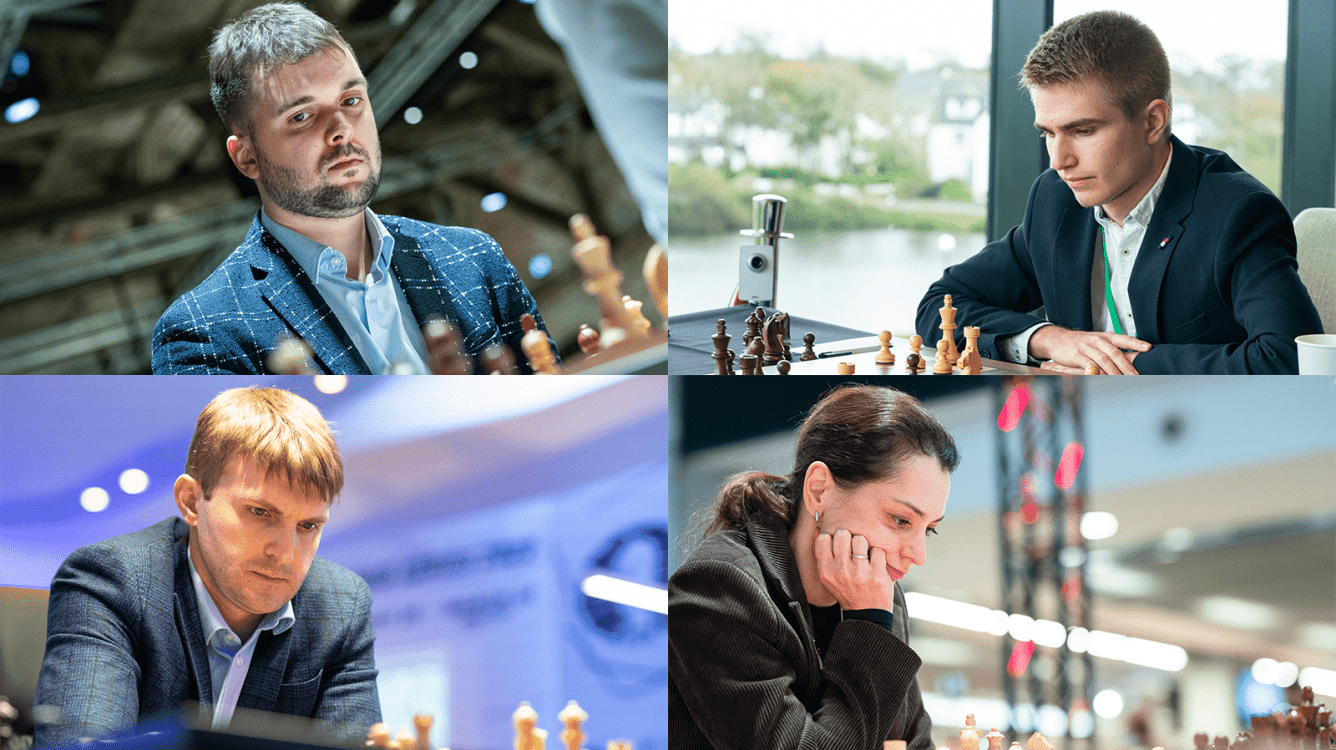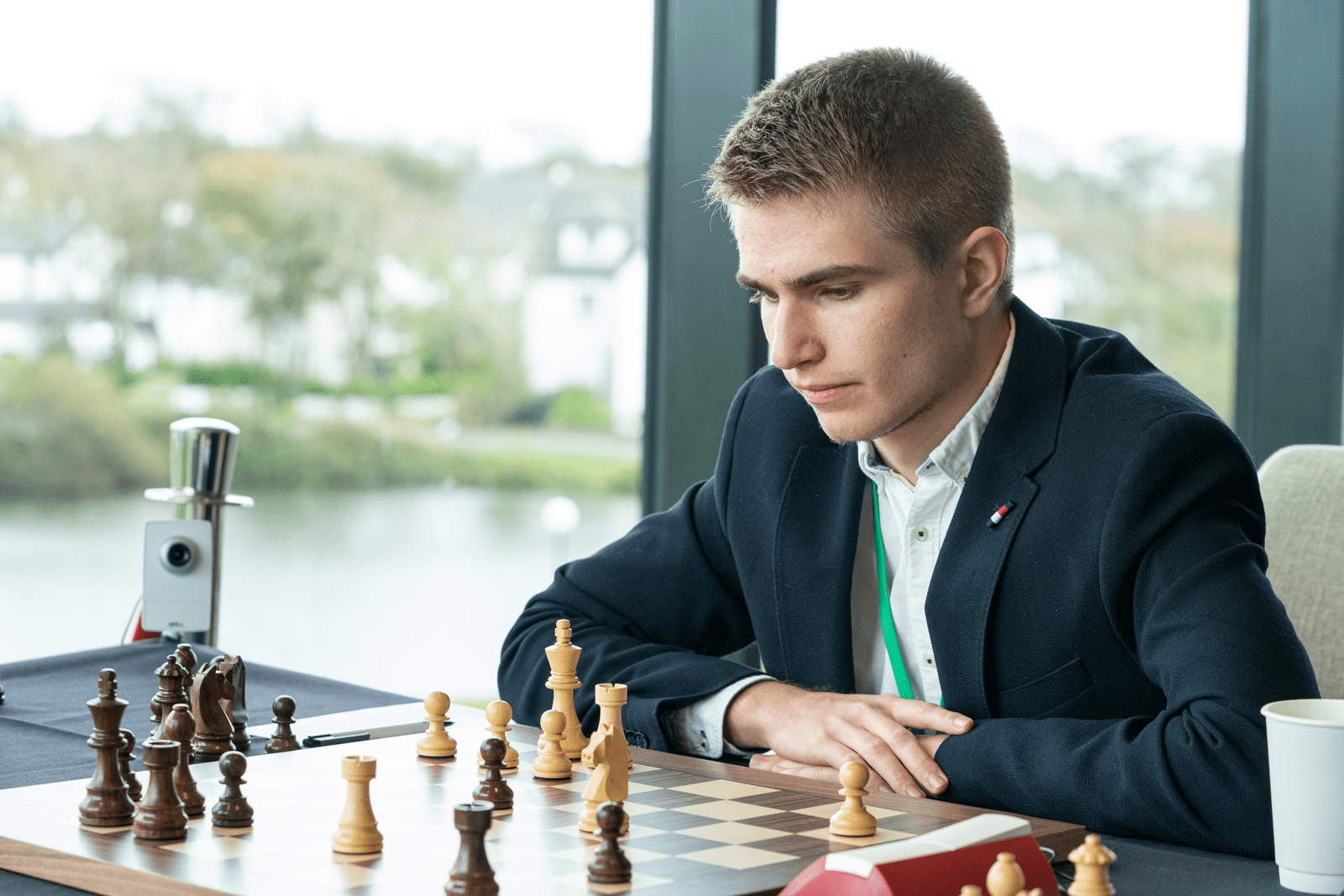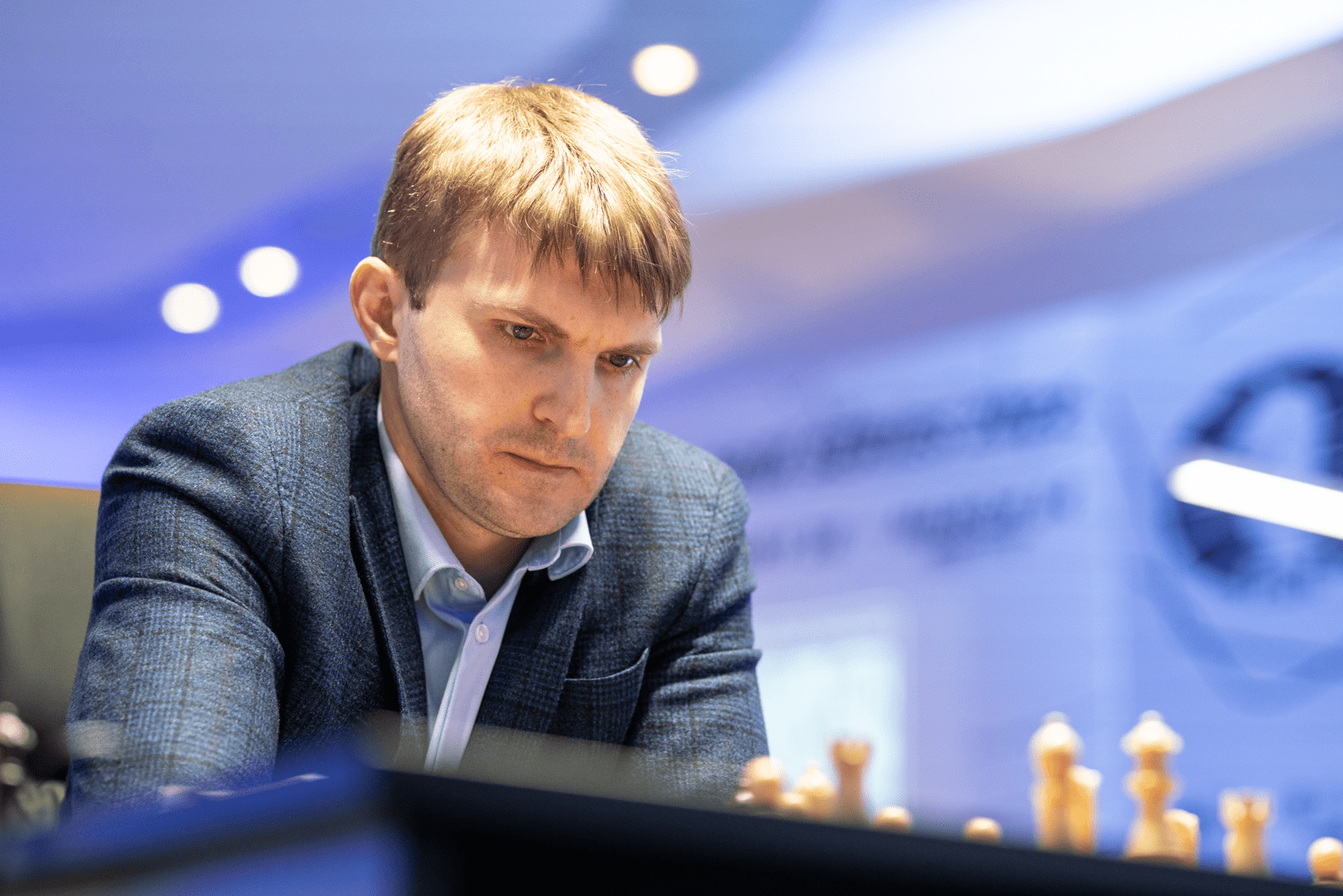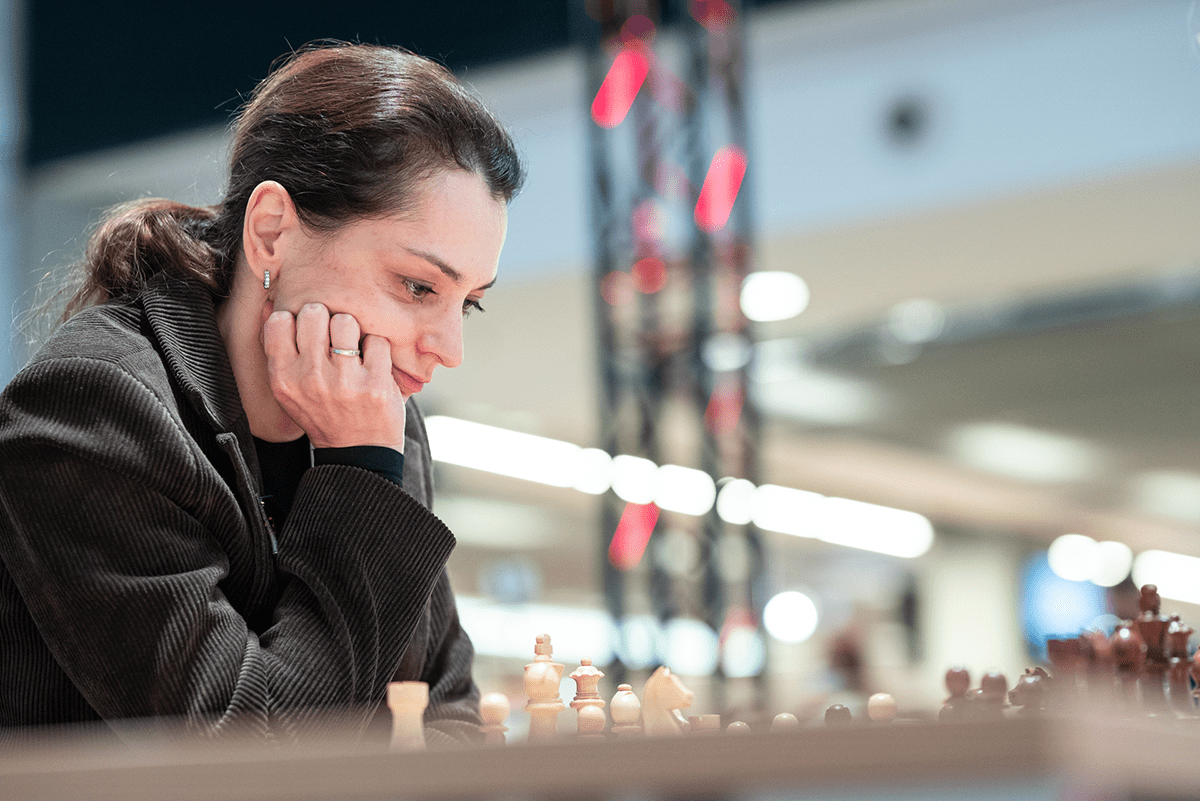
Russian Grandmasters Leave Russia: 'I Have No Sympathy For This War'
Since the start of the war in Ukraine, now more than two months ago, several Russian grandmasters have decided to leave their country or not return to it. Chess.com spoke to four well-known players about their views of the war and the personal choices they are making.
As was signaled by the German chess journalist Stefan Loffler, quite a few Russian grandmasters have decided to not spend their time in Russia right now. Some signed the open letter to Russia's President Vladimir Putin, some did not (for a variety of reasons), but they have one thing in common: they are against the war Russia started in Ukraine on February 24.
GM Dmitry Andreikin, GM Vladimir Fedoseev, and GM Alexander Predke all played in the FIDE Grand Prix series in February-March of this year and did not return to Russia when it ended. Andreikin traveled to North Macedonia, Predke went to Uzbekistan, and Fedoseev ended up in Spain, together with GM Daniil Yuffa, who served as his second at the Grand Prix. Soon, GM Kirill Alekseenko also joined them in Spain.
GM Alexey Sarana, who played in a GM tournament in Belgrade that was held alongside the FIDE Grand Prix, decided to stay in the Serbian capital and rented an apartment there for six months. GM Nikita Vitiugov, who already used to spend a lot of summertime in Spain, decided to stay there continually, at least for the time being. GM Alexandra Kosteniuk, who has been dividing her time living in both France and Russia recently, is not planning to return to Moscow anytime soon.
Besides Yuffa, who is now representing Spain, all of these players are among those who have switched federations from Russia to FIDE, which allows them to continue participating on an individual basis in international chess events. They include GM Grigoriy Oparin, who has been living and studying in St. Louis for the last two years. Another Russian player, GM Evgeny Romanov, moved and switched federations to Norway.
Vladimir Fedoseev
The 27-year-old Fedoseev has moved to the Valencia region in Spain, where he is spending most of his days working on chess, "checking some lines" as he says. Like several of his compatriots, he is also regularly participating in Chess.com events such as Titled Tuesday and the Rapid Chess Championship.
The grandmaster from Moscow (originally from Saint Petersburg) left Russia on February 27 to play in the FIDE Grand Prix in Belgrade. After the Grand Prix, Fedoseev served as the second for his friend Yuffa at the European Championship in Slovenia. (That was a case of roles reversed as Yuffa usually is Fedoseev's second, such as at the 2021 FIDE World Cup where Fedoseev came in fourth.) From Slovenia the two traveled to Spain where they rented a flat. Soon, Alekseenko also joined them.

In the Belgrade Grand Prix, which started three days after Russia's invasion of Ukraine, the Russian participants did not play under the Russian flag. On the first day, Fedoseev asked the organizers to remove the flag of the Russian Chess Federation from his board.
"My request to play under the FIDE flag had not been processed yet due to an administrative error," Fedoseev said. "Playing under the RCF flag for me means the same as loyalty for the country."
Fedoseev had "personal reasons" not to sign the open letter to Putin, but his stance against the war has been clear from the start. He says he could not live in a Russia where a majority is supporting the Russian aggression, which cannot be called war by law.
"I cannot imagine what would be my reaction to this," he said. "In Russia you also learn a lot about World War II and the symbolism, but now it looks the same, more or less. At the moment I think that it's not a democratic country. Also, I feel that this is going only worse and worse every day for Russia."
The Russian grandmaster said he made an "emotional but principled" decision to leave Russia basically on February 24, the day the war started. "Maybe I still need to come back, but I really do not want to represent them anymore, even once in life."
I really do not want to represent them anymore, even once in life.
—Vladimir Fedoseev
With his family still in Saint Petersburg, Fedoseev said he understands them, and also some of his colleagues who are still in Russia but have expressed anti-war sentiments, such as GMs Alexander Grischuk and Daniil Dubov. "My position is only my position in this case. I just developed other ways; this is my nature."
Fedoseev is planning to play in the Sharjah Open in the UAE and also a major open in Serbia soon. It is not clear yet whether these tournaments will be using the same "forbidden pairings" as at the European Championship, where pairings between Russian and Ukrainian players were avoided.
Fedoseev says he would understand it if a Ukrainian colleague didn't want to play against him at a tournament. "That would be absolutely fine. I get it that this is politically important to them. I hope they will get at least a draw in this situation."
Fedoseev said he is not surprised by GM Sergey Karjakin's strong support for the Russian government, but that he is surprised about how aggressive he has become in the last month. "He did not even try to say something against the war and such. He just gives all the support to people that made the decision to kill people in Ukraine."
Alexey Sarana
Sarana, a 22-year-old grandmaster who was living with his mother in Moscow, left Russia on March 1 to play in a round-robin tournament in Belgrade, organized alongside the Grand Prix. "I already thought about not going back, at least staying until it ends," he said. The war has now been underway for over two months with no clear sign of things ending soon.
For now, Sarana has rented an apartment in Belgrade with his brother until the end of August. He plays chess online, follows the news, and tries to improve his English. His mother supports his decision to not come back. His father is Ukrainian and lives close to Kyiv—he is safe.

"I love Russia a lot, but I hate all the political stuff," said Sarana. "What our government is doing now is absolutely disgusting. I cannot accept it, but I cannot do anything about it. But I have no sympathy for this war; all the reasons are absolutely terrible."
I have no sympathy for this war; all the reasons are absolutely terrible.
—Alexey Sarana
The reason Sarana's name is not on the open letter to Putin is simple: he wasn't asked. "Almost all my friends are chess players, and almost all do not support the war. Everyone is against it—except Karjakin."
Sarana follows the news closely and watches a wide variety of channels on YouTube, both pro-government and critical ones. "For me, it is unbelievable how many people support it," he said. "I don't know if it's true or not. Maybe it's bots that write the messages."
Last Sunday, two days after Chess.com spoke to him, Sarana won week 11 of the Chess.com Rapid Chess Championship. His opponent in the final was GM Andrey Esipenko, another player who made has clear that he is against the war. He still lives in Russia and played via a virtual private network, thus circumventing the blockade that Russia placed on Chess.com.
Nikita Vitiugov
For 35-year-old Vitiugov, from Saint Petersburg, it's hard to say when he left Russia for Spain exactly. He was already spending a lot of summertime at Costa Blanca and last year, after the birth of his son, he decided to stay continually for some time. "I always thought it was nice to raise my son near the sea," he said.
His last tournament in his home country was the 74th Russian Championship in October 2021, which he won. He has been in Spain with his family since late 2021 and doesn't plan to return to Russia any time soon.
Vitiugov did not sign the letter to Putin because he did not like the way it was worded, and he is not a fan in general of open letters. However, his position towards the war has been clear from the start. On February 25, he tweeted:
"Impossible to believe. In 2022, in Europe, people are dying in war, the fates of tens of millions of people are being broken. Horror. I don't see how emotions on the Internet can help. I will make my position clear—you cannot defend yourself on someone else's territory. Russians and Ukrainians are brothers, not enemies. Stop the war."
Невозможно поверить. В 2022 году в Европе люди гибнут на войне, ломаются судьбы десятков миллионов людей. Ужас. Не вижу, чем эмоции в интернете могут помочь. Зафиксирую свою позицию – нельзя защищаться на чужой территории. Русские и украинцы - братья,а не враги. Остановите войну.
— Nikita Vitiugov (@N_Vitiugov) February 25, 2022
Living in Russia is impossible at the moment for Vitiugov, who says: "First, most important is to stop this war. After that, I hope for some changes in Russia. But we will never know if that will happen."

He acknowledges that for some of his colleagues it's not easy to leave, even if they wanted to, and that it's not easy for them to live there at the moment: "It's very tough because you can't behave normally. You can't speak out what you really think. If you support this 'special operation,' you can do whatever you want, but if you even allow yourself to have some doubts, then everything is against you. Every word or action can and will be used against you. It can cost you a fine, some time in jail, or your career. The cost might be very big. The alternative is to behave like nothing is going on. For some people that is an option but not for everyone. It's impossible to pretend that it's the same. It's very challenging, very tough to live in this atmosphere."
If you support this 'special operation,' you can do whatever you want, but if you even allow yourself to have some doubts, then everything is against you.
—Nikita Vitiugov
Vitiugov also understands it when a Ukrainian player doesn't want to play him now. "I am not in their shoes, so I have no clue how I would have been acting in this extreme situation. All their anger and all their emotions towards Russia and Russians are understandable for me."
Right now, Russian players are not fully banned by FIDE for individual tournaments, as long as they don't play under the Russian flag. Most Ukrainians and some others have the opinion that the International Chess Federation is not going far enough. The chess body has followed more or less the policy of the big tennis organizations but last week, Wimbledon went a step further and announced that Russian and Belarusian players are not welcome this year.
Vitiugov thinks that's too much for people like him: "I think it is very important to point out this case with Russian people and sportsmen, who are standing against the war and still are being sanctioned or even banned," he said. "They are being pressed from both sides—Russia and the West—and then it deletes any difference between the ones who supported the invasion and the ones who didn't. I don't see any solution—maybe still it is right, but this is important to stress."
Alexandra Kosteniuk
Kosteniuk, who turned 38 last Saturday, is one of Russia's most successful players in history. She called from Miami, where she was celebrating the 15th birthday of her daughter.
Together with her husband GM Pavel Tregubov, Kosteniuk not only stays a lot in Russia but also in France, where her husband moved more than 20 years ago and where her daughter goes to school.
"We were in France but had tickets for March 4 to go to Russia. The flight got canceled, but at the moment I cannot imagine going back," she said.
Kosteniuk was "completely in shock" when the war broke out—and still is: "In Russia there are people who like to repeat that Russia 'has never attacked anyone in history.' I used to gladly believe such stories, that Russia had never invaded any other countries, but unfortunately, it’s not true. Of course, at the beginning of the year, we were following the news, and there were rumors about a possible invasion, but we refused to believe for a single moment in these stories. That’s why we were so shocked when it actually happened."

On the same day that the war broke out, Kosteniuk posted a visually powerful image on social media: a fully black square. In later posts, she expressed in text her emotions and position that is strongly against the war—a word she did not use, as it is not allowed. Instead, where another writer would use "war," she repeated the phrase "...*prohibited by the decree of the President of the Russian Federation of 03/04/2022."
Kosteniuk and Tregubov are following the news closely, reading historical books, watching videos, and listening to podcasts. "We discovered many brilliant Russian speakers, people in opposition, that we had not heard about before simply because we had never been following any politics at all," she said. "As chess players, now we are desperately looking for an answer, trying to understand what should have been done differently, where the crucial mistake had been made. It seems that people kept warning; they had been saying that it was going to happen."
Like GM Garry Kasparov? "Yes, like him for example, it was so hard to believe it, but he was right."
The war has split Kosteniuk's world in two, she says. "Even though we spend a lot of time outside of Russia, it will always be my country, my homeland. Seeing it collapsing right now, the consequences of the war to regular Russian citizens, not the people in power but ordinary citizens who are going to pay a huge price for it, is hard.... I feel this pain every single day."
According to Kosteniuk, Russia is in some ways returning to the Soviet Union, a country that ceased to exist when she was seven years old. "I've heard and read a lot about the times when people in my country were not free to say what they wanted to say. After the Soviet Union collapsed, the 1990s was a difficult time, but nevertheless we were free. I never experienced that I was forced to say or not say certain things. I was growing up in a free country. At least I felt that way and always had freedom of expression."
And that is also why she can't return to Russia now: "Going back means seeing propaganda all the time, listening and feeling this atmosphere. I don't know what to do right now. I want to be free, and right now I understand how important freedom is."
I want to be free, and right now I understand how important freedom is.
—Alexandra Kosteniuk
Also for Kosteniuk, the topic of banning Russian and Belarusian players is complicated. On Instagram, she wrote on April 16 that she does not approve of Chess.com's decision to block its members from playing under a Russian flag. However, she also feels this is not the moment to discuss such matters.
"I will be ready to conduct any discussions on the topics of restricting Russians on world platforms only after the military actions of the Russian government on the territory of Ukraine are completed. While this “special operation” is being carried out, I don’t see any moral right to speak about some kind of injustice. The government of my country is taking away the most important constitutional rights from its own citizens: the right to freedom, personal integrity and privacy, the right to freedom of speech and information, and other rights, printing laws that restrict their own citizens at a terrifying rate, and you talk about restrictions [on] Russians outside Russia. Before teaching anyone a free life and the law, let's deal with these concepts within our country."
In the call for this article, she elaborated: "I don't understand how we can discuss it. It's now been going for two months, and it's not clear how it can end anytime soon. I have been playing for my country for more than 20 years. It's quite a significant loss not to be able to play for the national team, but at the same time, how can we discuss this while this tragedy is taking place?"

